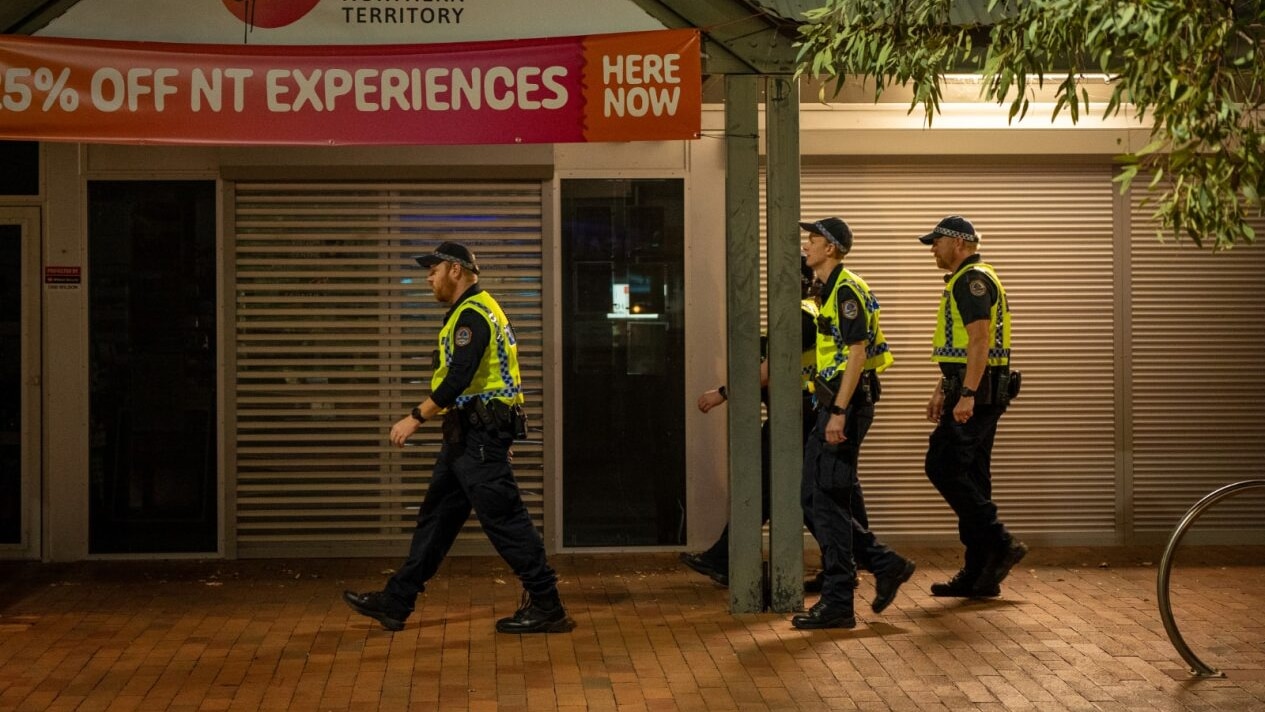
Nearly 60 additional police officers were surged into Alice Springs when the curfew was called late last month. (ABC News: Hamish Harty )
After a snap youth curfew, the Northern Territory government’s longer-term plan to reduce crime in Alice Springs has been to bolster the police presence in the streets.
Data shows the Northern Territory is already the most policed jurisdiction in Australia.
There are currently 505 sworn officers per 100,000 people — more than double that of the second-highest jurisdiction, South Australia.
But the NT also has the highest rate of homicide per capita in the country, and the highest rates of domestic violence.
Assaults and property offences are increasing, as is violent crime.
In an attempt to curb this, the NT government has invested more than $250 million to fund nearly 300 extra police officers, particularly for Alice Springs.
But will this lead to less crime, and who is protected by extra police?
What does the research say?
Executive director of the Bureau of Crime Statistics and Research (BOCSAR) Jackie Fitzgerald said evidence showed increased police numbers led lead to a drop in some types of criminal behaviour.
“Police activities like move-on orders and searches can put downward pressure on crime, particularly with relation to property crime,” Ms Fitzgerald said.
In 2019, the BOCSAR published a study using crime data from between 2000 to 2003, a period where the size of the NSW police force increased by 7.2 per cent following a major recruitment drive prior to the 2003 election.
The research primarily focused on property crime including break-and-enter, theft, motor vehicle theft and robbery.
While the results indicated a decrease in property crime, the arrest rate remained stable, leading the study to conclude that “police reduce theft and motor vehicle theft through deterrence rather than incapacitation”.
Ms Fitzgerald said a larger police presence could also lead to in an increase in crime detection, which wasn’t always positive.
“Often that crime might be lower-level crime,” she said.
“It might be liquor offences or drug possession offences … and there’s a harm in that because people are proceeded against and — particularly for vulnerable people — they can develop lengthy criminal histories because of these low-level contacts with police.”
Maria Giannacopoulos, director of the Centre for Criminology, Law and Justice at the University of NSW, said research raised concerns around how additional police could amplify issues such as racial profiling, racism and the impact on Aboriginal people.
“Crime can’t be understood in this very simplified way that governments are treating it as,” Dr Giannacopoulos said.
“Let’s think about who is most impacted by policing and even what I could call over-policing.
“How about taking a lens that asks: ‘To what extent does excessive policing actually amplify harm caused by the justice system’?”
Are police part of long-term solutions?
Ms Fitzgerald said although an increased police presence could help manage crime in the short term, decrease crime in the long-term required addressing factors that underpin people’s motivation to offend.
“Policing on its own, while it might reduce crime to some extent, it doesn’t tackle the causes of crime or the roots behind why people are offending,” she said.
“Often those are disadvantage and poverty … intergenerational poverty and intergenerational trauma, low levels of employments, problems with educational engagement — a whole raft of issues.”
Ms Fitzgerald argued the focus should be less on how many and more on how those resources are deployed.
“It’s very difficult to arrest your way out of a crime problem, especially an entrenched crime problem because there’s always a new cohort of offenders coming up through the ranks,” she said.
Ms Fitzgerald said a focus on “problem-oriented policing” could be one way forward, which meant probing why people were committing crimes.
“They maybe look at things like the time of day crime is occurring: Why is that? Is it because of a lack of recreational opportunities?” she said.
“Is it because of a lack of safe living arrangements?”
“Actually look at the reasons that precipitate offending and then try to build in supports that address those issues.”
[EMBED: Solutions]
News Related-
High court unanimously ruled indefinite detention was unlawful while backing preventive regime
-
Cheika set for contract extension as another Wallabies head coaching candidate slips by
-
Analysis-West's de-risking starts to bite China's prospects
-
'Beyond a joke' Labor won't ensure PTSD protections: MP
-
Formula One season driver ratings: Lando Norris shines as Max Verstappen nears perfection
-
Catalina golfer Tony Riches scores Guinness World Record four holes in one on same hole
-
Florida coach Billy Napier fires assistants Sean Spencer, Corey Raymond with expected staff shakeup ahead
-
Rohingyan refugee NZYQ accidentally named in documents published by high court
-
Colorado loses commitments of 2 more high school recruits
-
Queensland Health issues urgent patient safety alert over national bacteria outbreak
-
Townsville Community Pantry 'distressed' by fruit, vegetable waste at Aldi supermarket
-
What Is The Beaver Moon And What Does It Mean For You?
-
Labor senator Pat Dodson to resign from politics due to health issues
-
Hamas releases 11 more hostages, as Israel agrees to extend ceasefire
